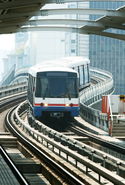As the majority of visitors to Thailand can speak little or no Thai, most communication between them and the Thais takes place in English. Although many Thais can speak some English, getting yourself understood, or understanding them, can often still prove difficult. This is because, especially amongst those with a limited education, Thai phrases are often translated word for word into English, and the English words are pronounced in a uniquely Thai way.
With no verb conjugations, no noun declensions, no "a" ,"an",
"the", "some" or "any", Thai
grammar is much simpler than English and makes a good understanding of
English grammar extremely difficult for Thais. This tends to lead to sentences
in English that are simplistic but still easily understandable. For instance,
"I didn't want to go yesterday" would likely be said instead as
"Yesterday I not want go". There's also the doubling of a few English
words where it happens in Thai e.g. "same same", "near near"
etc...Be careful when talking about the time though, as a different system
is used in Thailand where the clock is divided up into 4 lots of 6 hours,
rather than 2 of 12. This has potential for confusion, as if you are asked
to meet someone at "4 o'clock in the morning" it could really mean
4am or it could be a word for word translation of the Thai for 10am. The 24
hour clock is universally understood, and is generally safer.
In general though, pronunciation leads to greater problems in understanding than grammar does. For a start, some letters are at the end of a word (or syllable) in Thai are only half pronounced leading, for example, to the words "can" and "can't" sounding almost identical. Other English sounds don't exist in Thai and so are substituted for one that is close: "v" is always pronounced as "w" for instance. Thai also has separate letters for "r" and "l" sounds but these are used virtually interchangeably meaning, for example, that "very" is sometimes pronounced like "wely".
There's only a limited number of sounds that a word or syllable can finish in in Thai. Words ending in sounds other than one of these are 'converted' to another sound: "l" and "r" sounds will finish a word sounding like "n", "d" and "s" like "t" etc...So don't be surprised to hear words like the name "Russell" pronounced as "Rut-sen" or similar. This makes even words like '"yes" very difficult for Thais to say properly.
Words with two consecutive consonants in the same syllable are also problematic as they can't properly be pronounced in Thai (with a few exceptions). If they do occur, an extra vowel ("a") is inserted between them, which is another habit carried over by many when speaking English e.g "slow" as "sa-low" (or rather as "sa-low sa-low" since it is one of the words that is sometimes doubled). In words that end with two consonants, such as "grand", the second one is normally dropped. Few would be able to clearly pronounce the differences in "wish" and "with" for example, they would both sound like "wit". A word such as "shrimp", with three consecutive consonants at the beginning and two at the end, is just about impossible for the average Thai to pronounce properly.
Especially in foreign words, the er sound in words is very strongly emphasized e.g. ham-bur-gER, Man-ches-tER. You may not be understood without this emphasis pronounced. So if you were trying to tell a taxi to go to Bangkok's World Trade Center, you would have to ask for the wort trayt cen-tER. Despite the fact the Thai name is taken directly from the English, if you pronounce it as an English word you're likely not to be understood.
Generally, the higher the level of education of the Thai person, the fewer of these problems they will suffer from when speaking English. Some, of course, speak excellent English with absolutely none of them. Many people that the visitor will come into contact with are unlikely to be in this category however, such as taxi and tuk-tuk drivers / waiters & waitresses / street vendors / shop assistants etc...






Comments